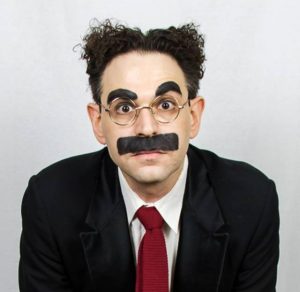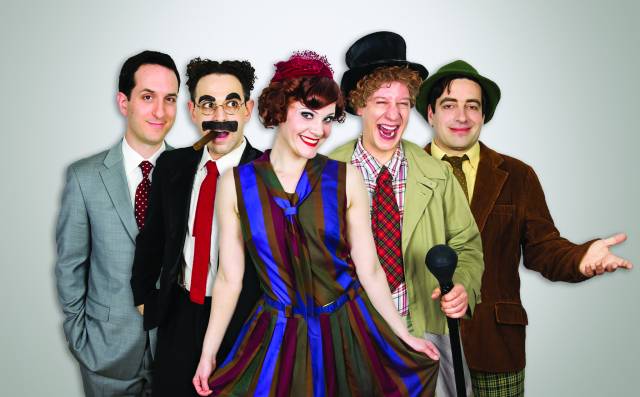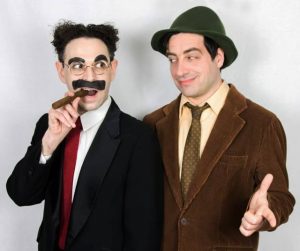

After attending a rehearsal of I’ll Say She Is the week before their first preview I went through something quite surreal. I watched a film that featured a clip of the Marx Brothers’ Duck Soup and the next day I was unsure if I’d seen it onscreen or at the rehearsal for the show. Such is the uncanny way in which Noah Diamond, Seth Shelden, Matt Roper and Matt Walters slip into the skins of Groucho, Harpo, Chico and Zeppo Marx to revive a show that was last seen onstage almost a century ago (granted, the show saw a gloriously funny staging at the 2014 FringeNYC Festival but it was only five performances). The musical revue showcased the siblings at what they did best: creating blissful mayhem. In this case they took on the mission of giving “thrills” to a young socialite (now played by Melody Jane) who has it all. It’s a spectacle that perfectly encompasses the ennui of both the Jazz Age and millennials.
Diamond acts as ringleader for a troupe that has turned disaster into an artform. Perhaps they’re taking a cue from Nietzsche's notion that “one must have chaos in oneself to be able to give birth to a dancing star”? If so, the hilarity and charm of I’ll Say She Is are almost blindingly bright. As researcher, writer and star of the show, Diamond has become a bonafide Marx scholar who slips in and out of character in the blink of an eye (I’m sure he would find a joke in here somewhere) but also has the thorough knowledge, and seriousness, of someone in love with the subject of his study (can we demand a Marx 101 class given by Professor Diamond?)
As the show gears for its official opening at the Connelly Theater, I spoke to him about final preparations, the future of the show, and snuck in some Marxist queries to satiate my own curiosity.
What’s been the most exciting part about getting to rehearse the show this time around?
We just moved into the theater and they’re building the set. We had been rehearsing big, beautiful numbers in relation to a sheet, so it’s amazing to see this tridimensional structure come to life from a piece of paper.
You’ve never seen the show and you will probably never get to be an audience member. What’s that like?
I was talking to Amanda [Sisk], who as the director will have the pleasure of sitting and watching. During our dress rehearsals I do sit out front and watch scenes I’m not in. But I do get denied the pleasure of watching it. I think of Lin-Manuel Miranda and how lucky he is to have Javier Munoz who goes on so he gets a chance to see what his show is like. For now not seeing the show from the house is a small price to pay.
You have two new siblings in this cast who weren’t in the Fringe production, two Matts actually.
You’re right, the Matt Brothers.
Where does one go to find new Marx Brothers?
It’s really tough! All four brothers in fact are really hard to cast. In this case for Chico we auditioned a lot of people, I think he might be the hardest to cast, or at least the one I’ve seen done less well more often. We actually had a pretty encouraging round of Chico auditions, we had three who were great. The guy we cast, Matt Roper, is just a dream. Not only does he have the voice and mannerisms, he’s also a comedian so that’s very valuable. It’s hard for actors to play the Marx Brothers because the typical acting stuff doesn’t apply. If you’re too focused on what your motivation is it’s impossible to behave like a Marx Brother, because so much of their comedy was about unmotivated chaos. Matt comes from the British musical tradition, he’s done a lot of one man shows as a character called Wilfredo, so he’s in the right spot.
Our Zeppo, Matt Walters is perfect. I’ve known him for more than 20 years, he actually appeared in the first musical I ever wrote in 1997. I’ve always had it in my head that he’d be a perfect Zeppo, he’s a great actor and has done great things without me. I thought he would be great as our Zeppo who is a co-equal Marx Brother, he’s the romantic co-lead and does lots of singing and musical comedy. So far in our previous incarnations he hadn’t been available and now he was. More important than the individual performers though, the chemistry is really good. With the four of us it feels we’re brothers, we seem to be good together and that’s important. The four brothers were each so distinct but had a spirit of unity and I think we’ve tapped into that.

Right, I saw you guys rehearsing and it was kinda creepy seeing you finish each other’s sentences when you were out of character. Would you say this sibling spirit is unique to playing the Marx Brothers though?
Interesting, I wouldn’t go so far as to say it’s unique to the Marx brothers because in a conventional play you could find actors who play siblings finding things in common and using them for dramatic effect onstage. I think in this case both because of the Marx Brothers thing and the specific people involved it’s like lucky alchemy. Seth and I have been doing the show since 2014, so he and I have this history with it and are very comfortable with each other. I have an almost sibling level understanding of Matt Walters because we have known each other for so long, and Matt Roper is relatively new to me, but he fits in so beautifully. He and Seth have formed a bond, Harpo and Chico were always a comedy team within the quartet so it’s great it worked out that well, they’re joined at the funny bone.
During the rehearsal I was captivated by a sheet Sabrina Chap, the musical director, had on her piano which basically was something along the lines of “we want more credit, we want more credit, we want more credit”. It struck me how much this 1924 sounded like 2008, but also how even back then the Great Depression had been just around the corner. You worked with her on the music for the show, and I wonder how little or how much do you allow contemporary history affect your 1924?
That’s a great question and it’s one we grapple with a lot and the “Wall Street” sequence is the best example of that. Working on that sequence I had half of the original material and I had to fill in the blanks with the rest. What was on my mind was exactly what you’re describing: how do you write a comedy sequence that takes place in 1924 Wall Street and that is supposed to be presented with no awareness of what was coming. In order to figure out what the mood was back then I read the business section of all the newspapers I’d already read the theatre sections of doing my original research. One of the things I discovered was that an awful lot of the Wall Street humor of the 1920s feels almost eerily prescient, it almost feels they knew the stock market would crash.
The more I read the more I realized the reason had been the 1920 Depression, that was not as severe as 1929 but was still a catastrophe. Very often a post-war economy suffers from the war economic boom, everyone was buying stock on credit where you could invest without putting money down, so everyone was getting rich very quickly. But there was an awareness that there was a bubble about to burst. Our “Wall Street” sequence has this giddy energy where everyone was getting rich, but the lyrics you describe where they say they’re gonna need more credit because you have to keep feeding the beast is what led to the crash, regulation and allowed for subsequent depressions and recessions to take place.
There is no easy answer though, we’ve taken great care not to anticipate anything that happened after 1924 and yet it’s completely inevitable that the audience will think of it. In the original show Groucho says to Beauty, “why are you crying little girl, are you lonesome or have you been listening to [President Warren G.] Harding’s speeches?”, Harding died in office during the out of town trial of I’ll Say She Is in Philadelphia in the summer of 23, so I assume they did not keep that joke in the show after he died. In our current version I think the line will be “why are you crying little girl, are you lonesome or have you been following the election?”
I think it’s great that we’re gonna have your show and we also have Shuffle Along on Broadway which is about 1921. I like how both shows are about rescuing something that is not unknown per se, but is also very unfamiliar to modern audiences. Why do you think we’re so fascinated with this decade?
There does seem to be a vogue for the Jazz Age, but it’s been going on for a while, NY has a Jazz Age Society that has parties and speakeasies, there are many aficionados of the 1920s who love the clothes and music. Fairly recently there was a successful adaptation of The Great Gatsby, and yeah Shuffle Along is very similar to our show but it’s more a show about a show, rather than a recreation. I don’t know how to explain it, but the 20s like the 60s conjure a world of music, fashion and entertainment that are very appealing. Another thing about the 20s that makes them kind of mysterious and wonderful is that the evidence we have of what happened during the decade tends to be so incomplete. If you’re studying any era from the 30s onwards you have sound on film and you can actually see for yourself more or less what it was like to walk in NYC in 1933. The 20s have silent footage and scratchy recorded audio, we have photographs and artifacts but it takes more imagination to reach back to them so it makes them tantalizing and very rewarding for the imagination.

Are you making sure the show is preserved in any way?
We have high hopes for it that way. We do remind ourselves a lot not to get too far ahead of things. As of now they’re building the first set the show has had in 92 years, and although it feels we’ve been working for this for a long time, and we have, my adaptation has only had a couple of readings and five shows at Fringe. So this version is just the next step in its development and if it’s successful it has a long life ahead. I have hopes for a touring company or a commercial production and one day maybe bring it back to Broadway. There are many people who have to see it onstage before making a video, another fantasy that dances in our heads is the fact that the Marx Brothers never made a movie out of this, maybe we could?
You also wrote a book about the production, so allow me to ask a Marx academia question. I learned that Papa Marx, Samuel, had been a tailor and Groucho described him as not being a very good one, but he somehow became very successful. We see the Marx Brothers in their movies be very bad at their jobs, Groucho especially he’s a terrible politician, hotel manager etc. Do you think in any way they were trying to pay homage to their dad by becoming famous for pretending to be very bad at their jobs?
That’s really interesting. I doubt that it was consciously done in tribute to Sam Marx, or Frenchie as he was always known because he was from Alsace-Lorraine, he spoke a French-German hybrid and was a dapper dandy kinda guy. I do think you’re onto something because I think they learned from Frenchie a sorta “fake it till you make it’ spirit, you’re right it’s very consistent with their approach, they say it and make it true. Their spirit was one of getting things done through moxy and attitude, if anyone questions you, you run them down with insults, nonsense and chaos. I would even take this further from the incompetent tailor and point out that their mother Minnie, who was their manager in vaudeville, wasn’t a business operator. She learned along the way, she did her best to push her boys on stage, she was a theatrical manager because she said she was. That’s analogous to Groucho in Duck Soup, he’s the President because he says he is. There is also something of the immigrant experience back then, you got to New York and it was a blank slate, it was a new life and if you said with confidence you were a tailor, a theatrical manager or a vaudevillian, then it was up to you to prove it.
For tickets and more information on I’ll Say She Is click here.